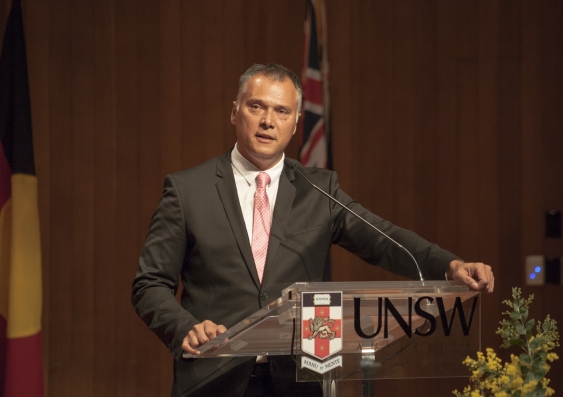In the wake of the ABC ‘Four Corners’ damning report on the incarceration of Indigenous children in the Northern Territory, journalist and “proud Wiradjuri man” Stan Grant has called for a national truth and reconciliation commission, “a full reckoning of our Nation’s past that may set loose the chains of history that bind this country’s first and today most miserably impoverished people.” He also called for a treaty with Indigenous Australians, similar to those in New Zealand, the United States and Canada.
Delivering the annual UNSW Wallace Wurth Lecture, titled ‘From reconciliation to Rights: Shaping a Bigger Australia’, Grant asked: “How can I stand here and speak to the idea of our place in an indissoluble commonwealth when this week my people have been reminded that our place is so often behind this nation’s bars?”
Prior to the lecture, Grant was awarded the honorary degree of Doctor of Letters by UNSW Chancellor David Gonski, in recognition of his eminent services to the community. Grant is currently Indigenous Affairs Editor at The Guardian Australia, and presents ‘The Point with Stan Grant’ on Indigenous television network NITV. In 2015, he won the prestigious Walkley Award for Coverage of Indigenous Affairs.
Grant told a packed Clancy Auditorium he had intended to deliver a more careful speech, seeking less to inflame and more to comfort, but watching the ‘Four Corners’ report had left him struggling to contain a pulsating rage. “Seeing images of a boy in a hood strapped to a chair, Aboriginal boys tear gassed, locked down and beaten,” he had rewritten his speech with his clenched fists hovering over the keyboard.
Grant talked of the pain he experienced watching the ‘Four Corners’ report with his teenage son. “I saw him lose his place in the world – with each scene of horror he became less sure of his country. He has been raised not to believe in our worst,” he said. “He has been spared the fate of so many of his people. But in these boys (on the screen) he sees something of himself, and asks how his country can allow this.”
The report, he said, he was reminder of the brutality inflicted on his own father and grandfather. “I saw in those boys the broken bones and stab wounds and dark ink jail tattoos of my father. I recalled the story of my mother’s father dragged from his bed by police accused of drinking. Arrested and tied to a tree like a dog.”
What a damning state of affairs to be the only Commonwealth nation not to enshrine the sovereign rights of its first peoples.
Grant said the royal commission announced by the Prime Minister might meet the minimum requirement for action but Indigenous Australians had already been the subject of endless inquiry. “The heads of our people rest still in glass jars in foreign museums and our skeletons contained in cardboard boxes – the artefacts of inquiry.”
And the culture of incarceration had continued, he said. “Today almost every face – man, woman and child – behind bars in the Northern Territory is black. Nationally, barely three percent of the population comprise a quarter of those in jails.”
Despite earlier reservations, fearing it would only harden divisions, he now accepted that Australia needed a mirror into its soul in the form of a truth and reconciliation commission. “How can we continue to look at endemic child suicide, intractable disadvantage and our choking jail cells as mere pieces of a policy puzzle scattered on a board devoid of the outline of our troubled past?”
Without such truth, he asked, what was this thing being called ‘recognition’? “I sit on the referendum council and this week the word itself, recognition, has felt small. In this week it reeks of incremental shift when we cry out for fundamental change. What is this perversity – that we should ask Australia to finally recognise us? That we should ask for others to decide whether we have a place in a constitution that was designed for our exclusion?”
Recognition on those terms, he said, felt like a betrayal of those who’d fought for a justice more deserving, more dignified. “Recognition risks shrinking our ambitions to fit a miserable national mood where the polity has lost faith in its politicians.”
Grant urged Australia to look to the examples of New Zealand, the United States and Canada and negotiate a treaty with its Indigenous population. “What a damning state of affairs,” he said, “to be the only Commonwealth nation not to enshrine the sovereign rights of its first peoples.”
After Grant’s address, in a vote of thanks, the UNSW President and Vice-Chancellor Professor Ian Jacobs noted the University was located close to a place of great learning – an 8000-year-old site around which the local Bedegal people had taught their children about a culture spanning hundreds of generations. Now, as then, he said, it was a place for sharing knowledge. And, more than ever, it was also a place for repairing wounds and righting wrongs.
“We take inspiration,” Professor Jacobs said, “from the powerful words of Stan Grant and others in the indigenous community. At UNSW we are committed to embedding Indigenous knowledge and perspectives in our programs right across the university, so that students and staff from all backgrounds will have a stronger understanding and appreciation of, and respect for, what it means to be Aboriginal – to be part of the First Peoples of this nation.”
Professor Jacobs said Grant had reluctantly but rightly become a beacon and a spokesperson for Indigenous Australia, and UNSW, under its 2025 Strategy, would do its part to advance the rights of his people.
READ an excerpt of Grant's speech.
LISTEN to the full speech.


